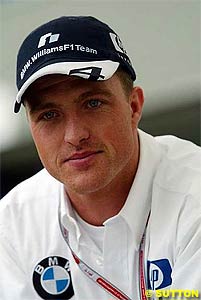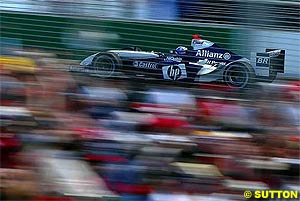Atlas F1 Magazine Writer
Fresh from the Formula One paddock
At a time when Formula One should well have concerned itself with Ferrari's Red Wash in Melbourne or the sport's qualifying format, rumourmongers chose, instead, to be pondering the possibility of a deal between Renault and Ralf Schumacher for 2005.
(After the CRB decision - and subsequent litigation - went Williams' way, EJ, somewhat put out, suggested his team was better off without the (then) crash-prone German: "He (Ralf) has gone to a team that can afford him, I'm not convinced we could (afford him)." Not be outdone, Williams' riposte was lightning-quick: "We've signed a driver who has learned his craft at someone else's expense...")
Since then, Ralf has won six Grands Prix and taken four poles - meritorious, yes, but hardly outstanding considering that, for two years, he had what amounted to, if not the best, certainly the second-best cars around, fitted, last year, with the top (BMW) engine and tyres (Michelin). Yet, the 28-year old was overshadowed in the speed stakes by teammate Juan Pablo Montoya (who finished third in the championship and scored more poles during 2002 than Ralf has in a to-date career spanning six seasons), and scuppered by inconsistency to finish a disappointed fifth in the title race with 58 points via two wins, three podiums, three pole positions and a single fastest lap.
So, any surprise, then, that Sir Frank has robustly resisted the combined high-pressure efforts of Schumacher and Weber for a contract extension at, say some, $20m per annum? Variously, Ralf has criticised the team boss for going back on his word, for suggesting that it is all "about money" and reneging on a deal allegedly agreed in Japan last year. Williams, for his part, has maintained a dignified silence, professing to not even having read Ralf's alleged outbursts.
Then, last week, Weber suggested Ralf was Renault-bound unless his present team agreed to renewal on his terms.
The Schumachers' manager is, of course, well acquainted with Renault (and former Benetton) boss Flavio Briatore, having jointly done the deal which saw Michael join the latter team after his stellar debut with Jordan at Spa in 1991. Flamboyant Briatore and nightclub owner Weber - with a little help from Bernard Charles Ecclestone - massaged Schumacher's switch to Benetton, the mechanics of which changed F1 forever and caused McLaren's Ron Dennis to dub the "sport" The Piranha Club. In partnership with Briatore Michael won two championships - one, his second in 1995, with Renault power.
Old friends, Briatore and Weber, then? Maybe not, but, certainly, more than nodding acquaintances. That Weber has discussed Ralf's situation and future with Briatore (and every other eligible team boss) is a given - that is, of course, his job. But, remember, Briatore has Fernando Alonso under contract, both via a personal deal and with Renault. Similarly, he holds the signatures of Jarno Trulli in both personal management and team capacities - although the deals expire at season's end - and controls the foreseeable future of Jaguar's Mark Webber.
The latter could well be Williams-bound in 2005, whilst IRL star Scott Dixon is also in the frame should Williams lose Schumacher in addition to Montoya, whose high-profile defection to McLaren is well-documented. Then, there is Williams test driver Marc Gene, who impressed the team with a gritty performance to fifth when he subbed for the injured Ralf at Monza last year. And, this prospect list is far from complete: Williams tested their former World Champions' progenies Nelsinho Piquet and Nico Rosberg earlier this year.
Just why would Williams, with all their options, (or Briatore/Renault, who immediately refuted Weber's alleged claim) secure Ralf's future at a time when F1 has more races still to run this year than made up the entire 2003 championship? Surely Weber, who has been around the F1 block for 14 years now, must realise Williams has been there for close on 30... Put differently, Williams was winning World Championships when Weber was raising Formula Ford budgets.
So, did Weber really advise the German daily Bild last week that "We are close to an agreement (with Renault team chief Flavio Briatore) on all major issues"? If so, it all smells of a very tacky negotiating ploy, inexplicably designed to scare Sir Frank, who dropped World Champions Nelson Piquet, Nigel Mansell and Damon Hill without fear of recrimination, into extending Ralf's employment soonest. Even Williams' Germanic engine partner BMW refused to take the bait after Schumacher and Weber played the patriotic card. "We are after the best driver regardless of nationality," said Dr Mario Theissen, boss of the company's motorsport division.
Finally, these rumours regarding Ralf overlook one minor issue: the parsimonious Frank Williams controls no less than 70% of Williams Grand Prix Engineering Ltd. It follows, then, that 70% of every million paid over to a driver is $700,000 out of his own wallet. Under those circumstances, it stands to reason that Sir Frank can withstand Weber's "pressure" a while longer before announcing his full 2005 driver line-up, does it not?
A week ago, in this column, we forecast an alteration to Formula One's tiresome 2004 Qualifying format. Then, last Friday, came an announcement that an attempt to change had failed because the ten competing teams failed to reach unanimous agreement on alternate proposals. (Apparently there were but two uncooperative votes to whatever was confidentially proposed. According to one team boss, there are no surprises as to the identities of the dissenters, and their sponsor colours are said to include red and silver.)
(ii) qualifying proper (ie for the grid) should begin at 14.00 local time rather than immediately after the end of the timed laps which determine the order in which cars qualify for the grid.
But, the rider is contained in the bulletin's final paragraph: "If the competing teams agree unanimously to this revised schedule, it will be put to the Formula One Commission by a fax vote. If the Commission is in favour and the World Motor Sport Council confirms the decision at its meeting on 24 March, the new schedule could be introduced from the Bahrain Grand Prix. In all other respects, the qualifying procedures would remain as published."
Now, unanimous agreement, as required by that archaic covenant, the Concorde Agreement, is about as rare as temperate weather in Malaysia. Whenever "unanimous agreement" is required, the doors are open for more bartering amongst teams than is seen for fake watches in Kuala Lumpur's Chinatown on a Friday night. So, watch this space for concessions given by the Micros to the Macros, particularly on electronics and engine prices, in return for changes to a timetable which allows Minardi and Jordan a modicum of breathing space between qualifying runs.
Then, the final sentence of the release: "In all other respects, the qualifying procedures would remain as published". Timing was but one (minor) problem - and, then, only for the minnows - with the major complaints relating to format, particularly for spectators - whether in stands or armchairs - who see but two flying laps per car in a period substantially longer than taken by an entire World Championship Grand Prix!
So, the proposal goes somewhere, but nowhere far enough. But, it is at least a start. At the root of F1's qualifying problem is the single engine rule. With power unit preservation now the essence of F1, it is well-nigh impossible to legislate any quantity of qualifying runs at any sort of speed.
How to enforce, for example, six laps per car at qualifying speeds in the first 30 minutes of pre-qualifying, and the same quantity in the final half hour? What constitutes "qualifying speed"? A lap time within an arbitrary 107% of pole position? With what fuel loads? In fact, how to enforce any quantity of laps at any speed at any time at all? Even the aggregate method once favoured by Bernie Ecclestone factors in only the two fastest laps of each session, so how to enforce a total of 12 or so laps? If the single-engine-per-weekend regulation has transformed F1 into, effectively, a one-day spectacle, imagine the effects of the suggested six-weekend rule!
So, where to with qualifying a la 2004? Why not back to 2003's format, which, at least attracted spectators on Fridays, provided short, if not-so-sharp, action on Saturday afternoons, and is compatible with the sport's present one-engine rule. That is the root of qualifying's present problems, and, until the regulation is changed, the days of qualifying providing the hottest laps of the weekend are gone. And, following ITV's decision to delay transmission of this Saturday's sessions, the days of live qualifying broadcasts may well be gone, too. Change can not come too soon.

 Now, the sights (or sounds) of the German - or more accurately, his manager, Willi Weber - doing the bidding in public are nothing new. The duo, after all, concentrated the collective minds of Formula One's Contract Recognition Board way back in 1998 when Eddie Jordan, despite Schumacher's affinity for mass destruction, attempted to retain the yellow-helmeted driver for his yellow team. On the other side, the newly-knighted Sir Frank Williams was after the young driver's signature as (expensive) sweetener for his pending BMW deal.
Now, the sights (or sounds) of the German - or more accurately, his manager, Willi Weber - doing the bidding in public are nothing new. The duo, after all, concentrated the collective minds of Formula One's Contract Recognition Board way back in 1998 when Eddie Jordan, despite Schumacher's affinity for mass destruction, attempted to retain the yellow-helmeted driver for his yellow team. On the other side, the newly-knighted Sir Frank Williams was after the young driver's signature as (expensive) sweetener for his pending BMW deal.
 But, just two days before on-track activities begin at Sepang, comes news of intended format change, but, alas, too late to save Malaysia's Saturday sessions from utter tedium. A bulletin issued by the FIA advises that a fax vote will be held on March 24 (three days after the season's second Grand Prix) about a change of time following a request by the Commercial Rights Holder (Formula One Management Ltd) to "facilitate television scheduling." The request is as follows:
But, just two days before on-track activities begin at Sepang, comes news of intended format change, but, alas, too late to save Malaysia's Saturday sessions from utter tedium. A bulletin issued by the FIA advises that a fax vote will be held on March 24 (three days after the season's second Grand Prix) about a change of time following a request by the Commercial Rights Holder (Formula One Management Ltd) to "facilitate television scheduling." The request is as follows:
i) the qualifying procedure should begin at 13.00 local time instead of 14.00; and
|
Contact the Author Contact the Editor |
Please Contact Us for permission to republish this or any other material from Atlas F1.
|
Volume 10, Issue 11
Atlas F1 Exclusive
Inside View into WilliamsF1 with Gene
Interview with Giorgio Pantano
Articles
Every Other Sunday
The Paint Job: Part III
2004 Malaysian GP Preview
2004 Malaysian GP Preview
Malaysian GP Facts & Stats
The F1 Trivia Quiz
Columns
Rear View Mirror
On the Road
Elsewhere in Racing
The Weekly Grapevine
> Homepage |
